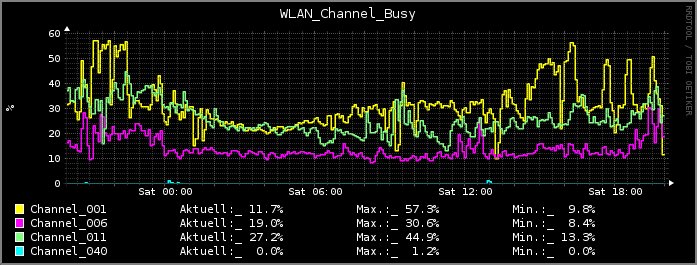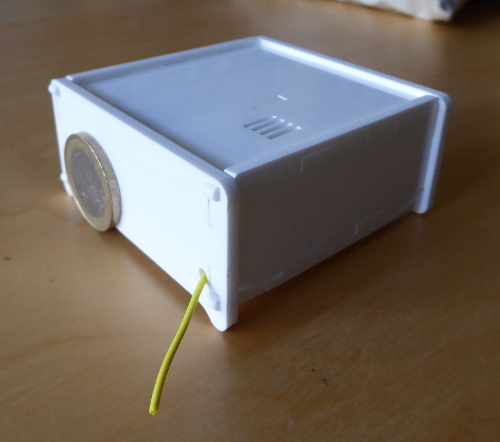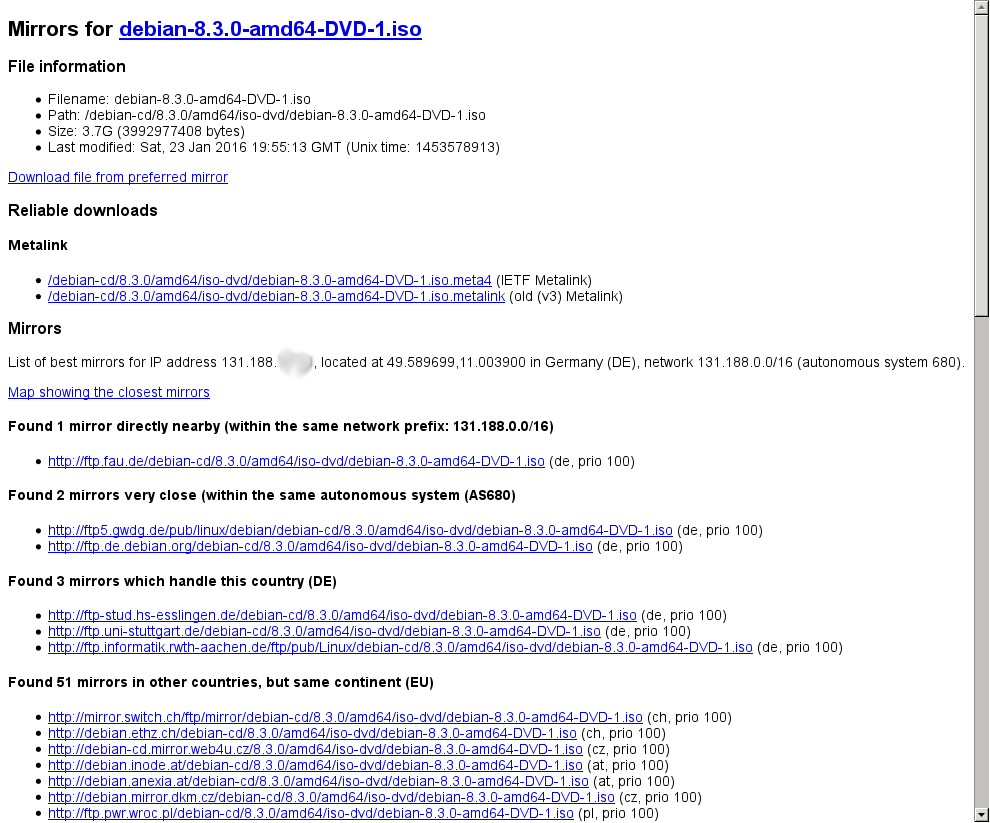Seit über einem Monat habe ich Probleme mit meiner Heizung.
Und obwohl seit mehreren Wochen eigentlich bekannt ist, wo das
Problem liegt, schafft es das "Kompetenzteam" aus
GBW Reparaturservice und beauftragter Heizungsfirma (Herzog Sanitär
aus Allersberg) nicht, das Problem zeitnah und dauerhaft zu beheben. Aber
der Reihe nach.
- Bereits in den Weihnachtsferien deuten sich die Probleme an:
Die beiden Heizkörper im Wohnzimmer zeigen gelegentlich Aussetzer.
Sie werden nicht mehr so heiss wie normal, manchmal werden sie
sogar nur noch lauwarm - das erzeugt natürlich genau gar
keine Heizwirkung. Die Thermostate (dank digitaler Thermostate
kann ich das gut verfolgen) haben das Ventil praktisch
dauernd zu 100% offen um die Temperatur zu halten. Wann sie warm
werden scheint zeitabhängig zu sein: Nachts heizen sie ordentlich,
tagsüber meist nicht.
- Fr., 22.01.: Da die Heizkörper im Wohnzimmer seit
zwei Tagen überhaupt nicht mehr warm werden, sondern
eiskalt sind, rufe ich beim "GBW Reparaturservice"
an. Die GBW hat fast alles, was früher die Hausmeister
erledigt haben, an eine Firma in München outgesourcet. Folglich
telefoniert man bei Problemen in seiner Wohnung in Erlangen mit
einem Callcenter im 200 km entfernten München, das
selbstverständlich durch ganz hervorragende Kenntnisse der
lokalen Gegebenheiten glänzt. Und selbstverständlich
spricht man bei jedem Anruf mit einem anderen Mitarbeiter,
die übliche Callcenterhölle halt.
Die geben dann erstmal
wahnsinnig hilfreiche Tips wie "entlüften" -
was ja im Prinzip nicht verkehrt ist, nur: Ich wohne im
Erdgeschoss eines mehrstöckigen Hauses, da ist Luft
im Heizkörper ein eher seltenes Problem. Und wenn
noch nichteinmal die Zuleitungsrohre zu den Heizkörpern
warm werden, umgekehrt aber wenn sie gerade funktionieren
die Heizkörper von vorne bis hinten absolut
gleichmässig heiss werden, dann ist das kein Problem
das sich mit entlüften meiner Heizkörper lösen
lässt.
Langer Rede kurzer Sinn: Da das Problem nicht dringlich ist,
bekomme ich einen Termin am Do., 28.01., da soll jemand
vorbeikommen um sich das anzusehen.
Ich versuche abends noch die Heizkörper zu
entlüften, aber es ist wie erwartet: Da ist keine
Spur von Luft drin, da kommt sofort ein Schwall Wasser
(auch bei den Heizkörpern die gerade eiskalt sind).
- So., 24.01.: Am späten Nachmittag sind plötzlich
alle 5 Heizkörper in der Wohnung komplett kalt.
- Mo., 25.01.: Als ich morgens aufstehe, steht das GBW
Hausmeisterauto vor der Tür, und die Heizung in der
Küche funktioniert wieder. Ich nehme an,
der Hausmeister würde die Heizung reparieren, das
erweist sich aber als Irrtum, er hat nur Aushänge
gemacht. Zwei Stunden später ist auch der Heizkörper
in der Küche wieder eiskalt.
- Di., 26.01.: Ich telefoniere morgens erneut mit dem Reparaturservice,
und melde dass jetzt alle Heizkörper ausgefallen sind
und es in meiner Wohnung unangenehm kalt wird. Die erste
Mitarbeiterin besteht darauf, dass ich erst noch die anderen
Hausbewohner befrage, ob bei denen die Heizung funktioniert,
denn wenn es bei denen funktioniert handelt es sich ja
um keinen Notfall. Dem kann ich nicht so ganz zustimmen,
ich finde eine komplett unheizbare Wohnung die mittlerweile
17 Grad hat, Tendenz fallend, eigentlich
Notfall genug, versuche es aber trotzdem - wenig erfolgreich.
Bei der einzigen Dame die
daheim ist funktioniert die Heizung - die hängt aber
auch offensichtlich an einem anderen Heizungsstrang.
Beim zweiten Anruf wird das Problem dann trotzdem
aufgenommen, und ich werde gebeten daheimzubleiben,
damit ich da bin wenn der Heizungsnotdienst kommt.
Das tue ich dann.
Als bis 17:30 noch niemand aufgetaucht ist oder sich auch
nur gemeldet hat, rufe ich erneut beim Reparaturservice
an. Ich erhalte die Auskunft, das Problem wäre an
die Firma Herzog weitergegeben worden, und die hätten
einen 24h Notdienst, es könnte also auch sein dass
der Techniker erst um 20 Uhr auftaucht. Tut er
selbstverständlich nicht, weder an diesem Tag
noch am Folgenden. Aber man opfert doch gerne einen
Tag Urlaub um sich verarschen zu lassen...
Ich denke ausserdem erst, ich hätte den Namen der
Heizungsfirma falsch verstanden, denn beim googlen nach
dem Namen ist die näheste Firma mit diesem Namen
in Allersberg, also gut 50 km entfernt. In den Folgenden
Tagen stellt sich jedoch heraus: Nein, ich hab den Namen
schon richtig verstanden. Die haben wirklich eine Firma
beauftragt, die 50 km Anfahrt hat. Vermutlich muss man
noch froh sein, wenn sie nicht gleich eine aus München
beauftragen...
- Do., 28.01.: Es meldet sich endlich jemand von Herzog.
Ist also eher ein 3x24h-Reaktionszeit-Notdienst als ein
24h Notdienst.
Der Techniker soll im Laufe des Nachmittags kommen.
Er kommt tatsächlich um kurz nach 13:00. Dass das
Problem nicht in meiner Wohnung liegt, ist ihm relativ
schnell klar - nachdem er überprüft hat dass
alle Heizkoerper kalt sind aber
die Ventile gängig sind. Allerdings
hat er wohl die Schlüssel für den Heizungskeller
vergessen, so dass wir dort nicht reinkommen - er ruft
den Hausmeister an, der ihm aufsperrt. Seine Fehlersuche
im Keller ist erst nicht erfolgreich, und er
überprüft die Heizungsanlage im Nebenhaus,
ebenfalls ergebnislos. Schliesslich wird er doch noch
fündig: Das Problem ist ein Differenzdruckregler,
der den Druck des Heizungsstrangs an dem ich hänge
regeln sollte, und ihn offensichtlich auf "null"
regelt. Als er dran rumfummelt geht das Ding mit einem
hörbaren WOOOSH Geräusch plötzlich auf -
und bei mir in der Wohnung werden praktisch sofort die
Heizkörper nicht nur warm, sondern ordentlich heiss.
Was genau es
nun war weiss er auch nicht - er meint, sowas könnte
schonmal vorkommen, die Dinger würden halt altern.
Er glaubt nicht, dass das Problem nochmal auftreten wird.
Oh wie falsch er damit lag...
- Mo., 01.02.: Die Heizkörper im Wohnzimmer bleiben
erneut eiskalt, jedenfalls tagsüber - nachts wird
einer der beiden manchmal lauwarm. Bei den Heizkörpern
im Rest der Wohnung ist das Bild gemischt, der im Bad
wird manchmal heiss und manchmal auch nicht. Nur der in
der Küche funktioniert fast immer.
- Di., 02.02.: Ich melde den erneuten Ausfall beim
Reparaturservice. Sie wollen es erneut an die Firma Herzog
weitergeben, die würde sich dann bei mir melden.
- Mo., 08.02.: Ich rufe erneut beim Reparaturservice an.
Sie wollen bei Herzog nachfragen.
- Di., 09.02.: Ich rufe erneut beim Reparaturservice an,
und bin langsam wirklich froh dass ich eine Telefonflat
habe. Die Mitarbeiterin vom Reparaturservice
versucht direkt bei Herzog nachzufragen, dort
geht aber nur der Anrufbeantworter ran, der verkündet,
dass die komplette Firma in den Faschingsferien ist.
Allerdings habe ihre Kollegin am Vortag wohl jemanden
erreicht, und der Firmeninhaber selbst habe versprochen,
sich um das Problem zu kümmern. Sie verspricht weiter
zu versuchen die Firma zu erreichen, und mich auf jeden
Fall zurückzurufen. Richtig geraten,
ein Rückruf kam natürlich nie.
- Fr., 12.02.: Ab 5:30 morgens werden die Heizkörper
im Wohnzimmer plötzlich wieder warm, die Ursache ist
unbekannt - vielleicht ist einer der Nachbarn übers
Wochenende weggefahren und hat die Heizung abgedreht, so
dass der Druck wieder für mich reicht. Die Heizkörper
im Wohnzimmer werden jedenfalls wieder brauchbar warm.
Nicht so heiss wie normal, aber immerhin so warm dass sie
eine spürbare Heizwirking erzielen - die ganze Zeit
über voll aufgedreht schaffen sie es bis mittags,
das Wohnzimmer auf fast 21 Grad aufzuheizen.
Um 12:50 ruft mich plötzlich ein Techniker von Herzog an,
er wäre jetzt bei mir daheim, ob ich kommen könnte.
Satte 10 Tage, nachdem ich das Problem gemeldet habe, und
vollkommen unangekündigt. Da ich aber natürlich
daran interessiert bin, dass meine Heizung irgendwann wieder
normal funktioniert, radel ich von der Arbeit nach
Hause.
Dort muss ich feststellen, dass der Techniker (ein anderer
als beim letzten Mal) zwar wenigstens die Schlüssel
für den Heizungskeller dabeihat, aber leider nicht
hier ist um den defekten Differenzdruckregler zu reparieren
oder tauschen. Im Gegenteil weiss er noch nichtmal
ansatzweise, was sein Kollege vor 2 Wochen bereits getan
hat, und auch sonst erweckt er nicht unbedingt einen kompetenten
Eindruck:
- Er faselt irgendwas davon, dass er im Keller Luft
in den Leitungen gehört hätte, und man
dringend entlüften müsste.
- Er dreht wild an den Ventilen für die anderen
beiden Heizungsstränge im Haus herum. Die sind
jetzt vermutlich nicht mehr so justiert wie
früher...
- Er sucht die Heizunganlage unter dem Dach. Klar, bei
den 15 cm dicken isolierten Rohren, die im Heizungskeller
aus der Wand kommen, und beschriftet sind mit
"Fernwärme Heizung
von X-Y-Strasse 42", kann man unmöglich
darauf kommen, dass das warme Wasser im Nebengebäude
erzeugt wird...
- Er führt mir stolz vor, wie der
Differenzdruckregler funktioniert, als ob ich das nicht
wüsste. Natürlich stellt er ihn danach nicht
wieder so ein wie zuvor, sondern irgendwie. Und
natürlich geht durch das Rumfummeln, wie bereits
zwei Wochen vorher, der Regler wieder auf und regelt
erstmal wieder so wie er sollte - was er aber nicht
kapiert.
- Als er danach feststellt, dass die Heizkörper
heiss sind, hält er mich offenbar für zu
blöd den Thermostat zu bedienen.
Die traurige Vorstellung endet damit, dass er unter dem
Vorwand, im Nachbargebäude den Wasserstand prüfen
zu wollen abhaut ohne sich zu verabschieden. Aber immerhin:
versehentlich hat er den kaputten Regler erstmal wieder
gängig gemacht, meine Heizung funktioniert wieder.
Wenn auch, weil er den Regler ja komplett verstellt hat, im
"Luzifer-Modus": Der Druck den er eingestellt
hat ist offensichtlich viel zu hoch, die Thermostate
schiessen regelmässig über die eingestellte
Temperatur hinaus, weil selbst eine Öffnung des Ventils
von nur 10% die Heizkörper innerhalb von 2 Minuten so
heiss werden lässt, dass man sie nicht mehr berühren
kann ohne sich die Finger zu verbrennen.
- to be continued... Ich glaube nicht, dass die Geschichte
hier zu Ende ist. Der Regler ist immer noch der alte, nur dass
er jetzt völlig verstellt ist, und wird vermutlich
bald wieder das spinnen anfangen.
Vielleicht funktionierts ja noch bis zum Sommer...
Ich hab jedenfalls daraus gelernt: Beim nächsten Mal werde
ich nicht naiv damit rechnen, dass die beteiligten Firmen
irgendwas auf die Reihe bekommen, und gleich den Anwalt einen
hübschen Brief zum Thema saftige Mietminderung aufsetzen
lassen. Vielleicht bringt das ja Bewegung in die Sache.
|


